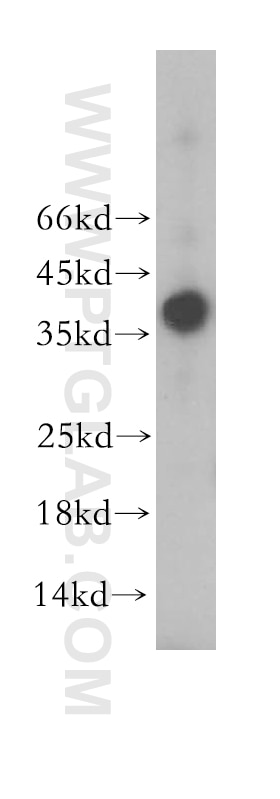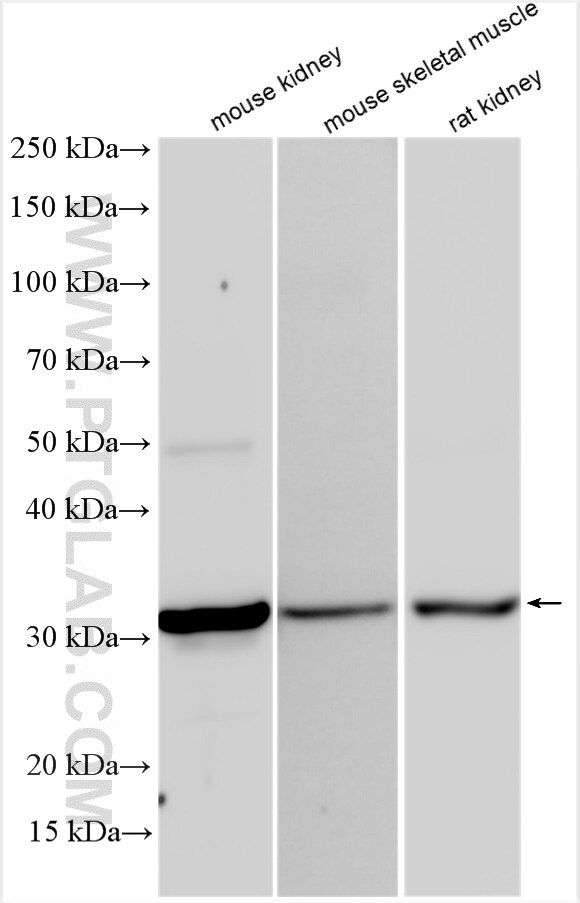Tested Applications
| Positive WB detected in | mouse kidney tissue, PC-3 cells, mouse skeletal muscle tissue |
Recommended dilution
| Application | Dilution |
|---|---|
| Western Blot (WB) | WB : 1:500-1:2000 |
| It is recommended that this reagent should be titrated in each testing system to obtain optimal results. | |
| Sample-dependent, Check data in validation data gallery. | |
Published Applications
| KD/KO | See 1 publications below |
| WB | See 3 publications below |
Product Information
17171-1-AP targets PSCA in WB, ELISA applications and shows reactivity with human, mouse samples.
| Tested Reactivity | human, mouse |
| Cited Reactivity | human, mouse |
| Host / Isotype | Rabbit / IgG |
| Class | Polyclonal |
| Type | Antibody |
| Immunogen |
CatNo: Ag10710 Product name: Recombinant human PSCA protein Source: e coli.-derived, PGEX-4T Tag: GST Domain: 1-100 aa of BC023582 Sequence: MKAVLLALLMAGLALQPGTALLCYSCKAQVSNEDCLQVENCTQLGEQCWTARIRAVGLLTVISKGCSLNCVDDSQDYYVGKKNITCCDTDLCNASGAHAL Predict reactive species |
| Full Name | prostate stem cell antigen |
| Calculated Molecular Weight | 123 aa, 13 kDa |
| Observed Molecular Weight | 36 kDa |
| GenBank Accession Number | BC023582 |
| Gene Symbol | PSCA |
| Gene ID (NCBI) | 8000 |
| RRID | AB_2172635 |
| Conjugate | Unconjugated |
| Form | Liquid |
| Purification Method | Antigen affinity purification |
| UNIPROT ID | O43653 |
| Storage Buffer | PBS with 0.02% sodium azide and 50% glycerol, pH 7.3. |
| Storage Conditions | Store at -20°C. Stable for one year after shipment. Aliquoting is unnecessary for -20oC storage. 20ul sizes contain 0.1% BSA. |
Background Information
Prostate stem cell antigen (PSCA) is a protein composed of 123 amino acid residues. PSCA belongs to the LY-6/Thy-1 family of cell surface antigens. It is highly expressed in normal prostate and further up-regulated in prostate cancer, as well as non-prostatic malignancies including gastric cancer. PSCA plays a critical role in cell adhesion, proliferation, and survival. The obasrved MW of PSCA is between 36 to 40 kDa in paper (PMID: 11309275).
Protocols
| Product Specific Protocols | |
|---|---|
| WB protocol for PSCA antibody 17171-1-AP | Download protocol |
| Standard Protocols | |
|---|---|
| Click here to view our Standard Protocols |
Publications
| Species | Application | Title |
|---|---|---|
J Immunother Cancer Impact of tumor localization on antitumor immunity with conditionally activated CTLA-4 blockade | ||
Endocrinology mTOR regulates mineralocorticoid receptor transcriptional activity by ULK1- dependent and independent mechanisms | ||
PLoS One Pan-cancer analysis of PSCA that is associated with immune infiltration and affects patient prognosis
|






